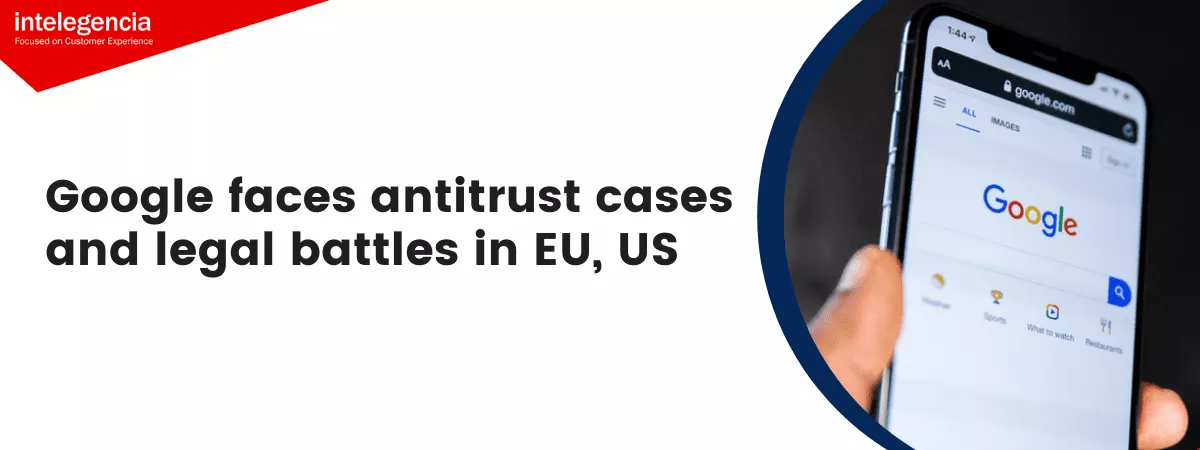Google faces antitrust cases and legal battles in EU, US
 Angelika Tirona
February 15, 2021
Angelika Tirona
February 15, 2021
“Google it,” is a common line for the ordinary folk. While it seems like nothing more than everyday jargon, this phrase tells a lot about the influence of the biggest search engine on the internet today.
How can you identify a company’s impact in its industry? Either by how fast and easy consumers can recognize or use their branding. In this case, it’s how we’ve replaced the term “search” with a brand name that offers the exact service.
Fire up your mobile phone or your desktop, and you’ll be welcomed by tons of applications bearing the Google logo (or its signature multi-colored icons). There’s no denying that the tech giant has dominated the digital space for its consumers. It has the power and the impact to sustain its hold on the industry.
But like any power, it comes with a price – and more specifically, in the form of antitrust fines and legal battles.
The story behind Google’s success
Google’s monopoly on search engines extends to over 80 percent of the market worldwide. Today, the company handles over 90 percent of all searches.
However, Google wasn’t always seen as tough competitor in the industry, especially during its early days. When the internet was yet as big as it is now, there was a single most important portal on the internet: Excite. In the late 90s, Excite offered its own email service and search engine.
The founders of Google once offered to sell the company to Excite for a small sum of $750, to which the company declined – as did Yahoo!. Three years later, Excite went bankrupt and Google rose to popularity.
While both Excite and Yahoo! offered search engine services, Google’s algorithm stood out because of one aspect: It prioritized results based on user preferences (as opposed to the two companies that prioritized based on their own interests). In addition, Google focused on search, while Excite and Yahoo! tried too early to offer all of its services in a single platform.
In the end, users trusted Google, which allowed it to expand across search, Cloud, and now video streaming through Youtube.
The temptation of monopoly
The internet is a vast space, and most of what we use today are under the umbrella of Google or the five major players in the market called “The Big Tech.”
Like many successful companies, Google had the opportunity to be the only provider of reliable search engines and other digital products. Its incredible climb and growth allowed Google to buy off their competitors and take charge of prices.
For example, after Google bought Android in 2005, the company took hold of a majority of OS users in the market. Today, seven out of 10 devices are Android-powered across all brands of mobile phones. With this, Google can use these devices to advertise its products and services, such as Chrome and Google Play. At this point, it would be difficult for any other OS vendor to compete.
While it seems like the perfect setup for Google, it brought some problems and concerns from consumers.
What is the problem with being big?
Following its dominance in the online and tech industries, Europe placed legal complaints on Google’s lap, which resulted to a $4 Billion Fine by the European Commission in 2019. The concerns consisted of two: Abuse of power and Unfair advantage.
Many traditional companies were not happy with how Google digitized its services, such as news, books, and maps. For instance, before the company offered Google Maps in 2005, quite a number of digital mapping companies offered online maps for a price. When Google entered the market, they made the service completely free. As a result, the earlier paid map services went bankrupt.
While there seemed to be no problem with monopolizing the service, Google changed its business model the moment its competitors were gone. They removed the free service and offered Google Maps for a price, which led France cartographers to accuse the company of what it called “dumping.”
Google’s legal battles were not limited to Europe. The US Justice Department and 11 other states accused Google of antitrust violations and illegal monopolization – a feat that will likely go on for years.
The consequences for Google
At best, Google will have to pay the fine if it loses the case. However, there are also other implications.
It seems that Google may soon be forced to share its platforms and algorithms with competitors. If not, another option would be to force Google services to split into different companies. This setup, however, has one problem: It will allow Google to monopolize the specific industries that its companies play in.
As for competition, tech companies including Spotify and Fortnite are already working to reform app stores. These companies pay huge commissions to stay in the Google app store. And yet, they are still overshadowed by Google’s advertisements on its own platforms.
Judging from the current situation of Google and its fellow vendors, it’s extremely likely that these tech companies may soon join together to create their own Google competitor. Who knows, maybe we will see the next conglomerate arise from the other digital giants in the market.
Angelika Tirona is a Content Writer at Intelegencia. When she is not working, you can find her trying out new restaurants and dishes
Comment(s)
_BlogComment.Message
